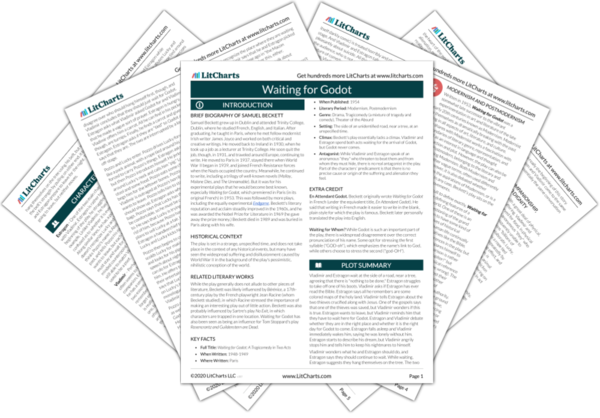Closely related to the Modernist and Postmodernist aspects of Beckett's play is its conception of time, an issue of fascination to Modernists and Postmodernists alike. Perhaps the most important thing about time in the play is that it is uncertain. All of the characters (and thus the audience, as well) are unsure of exactly when the play is taking place. The time period of the play is unclear, as is the relative chronology of the play's events. Vladimir is rather sure that act two is one day after act one, but all the other characters disagree. Moreover, everyone except for Vladimir seems to have forgotten the events of act one by the time act two begins. In act two, Vladimir and Estragon even disagree over what time of day it is.
Amid all this uncertainty, the one thing that seems certain is that time is recursive in Waiting for Godot. That is, the same events occur again and again, while characters also repeat themselves. As Pozzo and Estragon forget their immediate past, they end up repeating much of act one in act two. Vladimir and Estragon wait in the same place, where the same two people (Lucky and Pozzo) encounter them, and where a boy delivers the same message from Godot. Vladimir himself wonders to what degree the events of act two are an exact repetition of those in act one, as he asks whether Lucky and Pozzo are the same characters from the previous day, and whether it is the same young boy, or a different one. The boy claims to be a different boy from that of act one, and Pozzo does not remember Vladimir or Estragon, but given all of the forgetfulness in the play, Vladimir's questions remain unanswered.
With this strangely repetitive temporal structure, the characters of Waiting for Godot are trapped within an infinite present time. "Time has stopped," says Vladimir in act one. Indeed, the ending of the play seems somewhat arbitrary. It could have continued on for however many acts, endlessly repeating, as Vladimir and Estragon endlessly await the arrival of the mysterious Mr. Godot. Moreover, it is not clear that the beginning of the play was really the beginning of this story. How many days did Estragon and Vladimir come to the same part of the road and have essentially the same conversation before the day of act one?
Time ThemeTracker

Time Quotes in Waiting for Godot
I'm glad to see you back. I thought you were gone forever.
You're sure it was this evening?
What?
That we were to wait.
He said Saturday. (Pause.) I think
But what Saturday? And is it Saturday? Is it not rather Sunday? (Pause.) Or Monday? (Pause.) Or Friday?
Mr. Godot told me to tell you he won't come this evening but surely tomorrow.
It must be the Spring.
But in a single night!
I tell you we weren't here yesterday. Another of your nightmares.
We came too soon.
It's always at nightfall.
But night doesn't fall.
It'll fall all of a sudden, like yesterday.
Then it'll be night.
And we can go.
Then it'll be day again.
Have you not done tormenting me with your accursed time! It's abominable! When! When! One day, is that not enough for you, one day he went dumb, one day I went blind, one day we'll go deaf, one day we were born, one day we shall die, the same day, the same second, is that not enough for you?
Tell him... (he hesitates)... tell him you saw me and that... (he hesitates)... that you saw me. (Pause. Vladimir advances, the Boy recoils. Vladimir halts, the Boy halts. With sudden violence.) You're sure you saw me, you won't come and tell me tomorrow that you never saw me!











